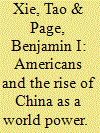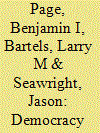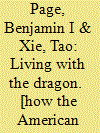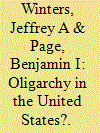|
|
|
Sort Order |
|
|
|
Items / Page
|
|
|
|
|
|
|
| Srl | Item |
| 1 |
ID:
095540


|
|
|
|
|
| Publication |
2010.
|
| Summary/Abstract |
The rapid ascendency of China has attracted considerable attention from American scholars, policymakers, and media. Yet what does the American public think about the rise of China as a world power? In this paper we use survey data collected by the Chicago Council on Global Affairs and other organizations to explore the nature and causes of Americans' views. It turns out that most Americans are well aware of the rise of China. Some are apprehensive about that rise, chiefly for national security (rather than economic) reasons, and many favor a degree of off-shore 'balancing' of the sort that realists recommend. But few Americans want to actively work to limit the rise of China. Very few favor the use of troops to defend Taiwan. Very few favor a nuclear-armed Japan. Large majorities of Americans take stands more akin to those of neo-liberals than realist theorists, favoring cooperation and peaceful engagement with China.
|
|
|
|
|
|
|
|
|
|
|
|
|
|
|
|
| 2 |
ID:
121590


|
|
|
|
|
| Publication |
2013.
|
| Summary/Abstract |
It is important to know what wealthy Americans seek from politics and how (if at all) their policy preferences differ from those of other citizens. There can be little doubt that the wealthy exert more political influence than the less affluent do. If they tend to get their way in some areas of public policy, and if they have policy preferences that differ significantly from those of most Americans, the results could be troubling for democratic policy making. Recent evidence indicates that "affluent" Americans in the top fifth of the income distribution are socially more liberal but economically more conservative than others. But until now there has been little systematic evidence about the truly wealthy, such as the top 1 percent. We report the results of a pilot study of the political views and activities of the top 1 percent or so of US wealth-holders. We find that they are extremely active politically and that they are much more conservative than the American public as a whole with respect to important policies concerning taxation, economic regulation, and especially social welfare programs. Variation within this wealthy group suggests that the top one-tenth of 1 percent of wealth-holders (people with $40 million or more in net worth) may tend to hold still more conservative views that are even more distinct from those of the general public. We suggest that these distinctive policy preferences may help account for why certain public policies in the United States appear to deviate from what the majority of US citizens wants the government to do. If this is so, it raises serious issues for democratic theory.
|
|
|
|
|
|
|
|
|
|
|
|
|
|
|
|
| 3 |
ID:
082030


|
|
|
|
|
| Publication |
2008.
|
| Summary/Abstract |
Americans' feelings about foreign countries are embedded in foreign policy belief systems and affect policy preferences. The analysis of nine surveys of the US general public conducted between 1978 and 2006 indicates that on average Americans have had rather lukewarm or slightly cool, nearly neutral, feelings toward China, India, South Korea, Taiwan, and Indonesia; warm feelings toward Japan and Australia; and cold feelings toward North Korea and (at least since 2001) toward Pakistan and Afghanistan.
Individuals' feelings are affected by certain personal and social characteristics. High levels of formal education tend to make people feel considerably warmer toward most of these countries-especially Pakistan, Afghanistan, and India. Education increases information: those who know more about the world generally express warmer feelings. But most important are internationalist attitudes, especially putting a relatively low priority on US domestic threats and concerns, embracing capitalism and world markets, and espousing world antipoverty goals. National security considerations play only a limited part. Policy implications are discussed
|
|
|
|
|
|
|
|
|
|
|
|
|
|
|
|
| 4 |
ID:
101569


|
|
|
|
|
| Publication |
New York, Columbia University Press, 2010.
|
| Description |
xviii, 212p.
|
| Series |
Contemporary Asia in the world
|
| Standard Number |
9780231152082, hbk
|
|
|
|
|
|
|
|
|
|
|
|
Copies: C:1/I:0,R:0,Q:0
Circulation
| Accession# | Call# | Current Location | Status | Policy | Location |
| 055618 | 327.51073/PAG 055618 | Main | On Shelf | General | |
|
|
|
|
| 5 |
ID:
100842


|
|
|
|
|
| Publication |
2009.
|
| Summary/Abstract |
We explore the possibility that the US political system can usefully be characterized as oligarchic. Using a material-based definition drawn from Aristotle, we argue that oligarchy is not inconsistent with democracy; that oligarchs need not occupy formal office or conspire together or even engage extensively in politics in order to prevail; that great wealth can provide both the resources and the motivation to exert potent political influence. Data on the US distributions of income and wealth are used to construct several Material Power Indices, which suggest that the wealthiest Americans may exert vastly greater political influence than average citizens and that a very small group of the wealthiest (perhaps the top tenth of 1 percent) may have sufficient power to dominate policy in certain key areas. A brief review of the literature suggests possible mechanisms by which such influence could occur, through lobbying, the electoral process, opinion shaping, and the US Constitution itself.
|
|
|
|
|
|
|
|
|
|
|
|
|
|
|
|
| 6 |
ID:
135964


|
|
|
|
|
| Summary/Abstract |
AS IS WELL KNOWN, AMERICANS WITH HIGHER INCOMES tend to be more politically active than lower-income citizens. They vote more often, engage in more political discussions, attend more campaign events, contribute more money, and contact more public officials.1 But research to date has only examined the moderately affluent respondents that surveys of the general public are able to reach: the top 20 percent or 30 percent of income earners. What about really wealthy Americans, with incomes or wealth in the top 1 percent, who might potentially have a great deal of political influence? Do they—as resource-based theories would suggest2—participate at still higher levels than the merely affluent? Do they more often initiate contacts with high-level government officials? If so, about what? Matters of narrow economic self-interest or the common good (as they see it)? Answers to these questions may have implications for the workings of democratic politics.
|
|
|
|
|
|
|
|
|
|
|
|
|
|
|
|
| 7 |
ID:
134528


|
|
|
|
|
| Summary/Abstract |
Each of four theoretical traditions in the study of American politics—which can be characterized as theories of Majoritarian Electoral Democracy, Economic-Elite Domination, and two types of interest-group pluralism, Majoritarian Pluralism and Biased Pluralism—offers different predictions about which sets of actors have how much influence over public policy: average citizens; economic elites; and organized interest groups, mass-based or business-oriented.
|
|
|
|
|
|
|
|
|
|
|
|
|
|
|
|
| 8 |
ID:
123703


|
|
|
|
|
| Publication |
2013.
|
| Summary/Abstract |
This paper investigates macro-level sources of variations across countries regrading China's national image, as measured by the proportion of the public in each of 35 countries that expressed a favorable view of China in the 2007 Pew Global Attitudes Survey. It turns out that several expected factors have no significant measurable impact on China's image: not the extent of strategic ties between China and a given country; not the political system of that country; not the extent of Chinese investment in the country; and not the number of Confucius institutes and classrooms in that country. The only macro-level factor we find to affect China's image in a country is that country's level of economic and social development, as measured by the UN Human Development Index. Controlling for the other factors, publics in poor or developing countries are much more likely to have a favorable image of China than publics in economically advanced countries. Some implications of our findings are discussed.
|
|
|
|
|
|
|
|
|
|
|
|
|
|
|
|
| 9 |
ID:
062107


|
|
|
|
|
|
|
|